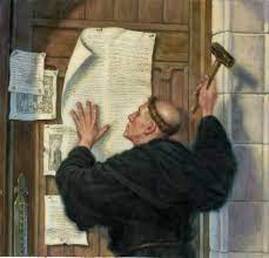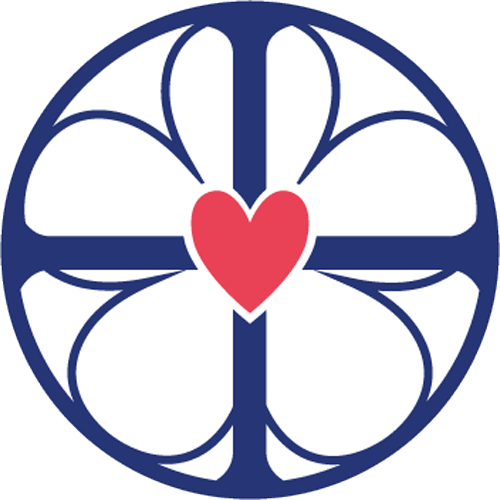What do Lutherans Believe?
|
Lutherans are part of the One Holy catholic and Apostolic Church reaching back to the early days of Christianity. We believe ourselves to be a reform movement within Western Christianity- seeking to bring it back to its foundations and away from the excess and corruption of the Roman/western Church during the middle-ages.
A central tenant of Lutheran faith is the restoration of the belief of the early church, as found in the Holy Scriptures, that our Justification (or salvation) is not something that we earn but something that is a gift of God given to us through Faith Alone and by Grace Alone. We believe that we can find all things that are necessary for salvation through the Word of God or through Scripture Alone. Martin Luther sparked the reformation and this is where we get our name- Lutherans. Luther did not like this term and preferred for us to be called 'Evangelicals' or Gospel Christians. However, after the term Evangelical in English came to mean a very different form of church - as a result this term is not used as much as it once was to avoid confusion. As Lutherans we subscribe to, confess, and believe in the historic creeds of the One Holy catholic and Apostolic Church - namely the Apostles, Nicene (with the addition of the filioque), and Athanasian Creeds. Along with the Orthodox, Roman, Anglican, and other Churches we confess that the "teachings of the [7] ecumenical councils of the early Church are normative for the faith and life of our churches today" (Lutheran World Federation https://www.lutheranworld.org/sites/default/files/1993-Lutheran_Orthodox_Dialogue-EN.pdf). Lutherans also accept, teach, and confess the Augsburg confession as well as the other books of the Lutheran Book of Concord (https://bookofconcord.org/). These documents explain the ways in which Lutherans seek to reform Western Christianity. As a congregation of the Lutheran Church in Great Britain- St Luke's and St Matthew's accepts the LCiGB statement of faith (https://lutheranchurch.co.uk/about/). We are part of the LCiGB synod and as such receive oversight from an elected Bishop within Apostolic Succession (in common with the Anglican, Roman, and Orthodox Churches). Our Bishops are elected for a 6 year term after which they can stand for re-election or can be replaced if the synod so votes. Our synod is part of the Porvoo Communion (in common with many European Anglican and Lutheran Churches) and we are also part of the Lutheran World Federation. We are represented at national and international ecumenical gatherings and supported by the Council of Lutheran Churches (https://www.lutheran.org.uk/). The Lutheran World Federation describes Lutherans in the following ways: (https://www.lutheranworld.org/who-we-are/our-lutheran-identity) We are Evangelical "We proclaim the “good news” of Christ’s life, death on the cross, and resurrection and Christ’s unconditional promise: “forgiveness of sins, justification, and eternal life” (AC, Article IV)." At St Luke's and St Matthew's we seek to make the gospel the heart of everything that we do and say. The preaching of Christ is the first, last, and only task of the Church and all else is done in response to this call. We are Sacramental "Faith in the unconditional promise is created by the Holy Spirit through the gospel “purely preached” and the holy sacraments “administered according to the gospel.” (AC Article VII). Our worship of the Triune God and our life together as a communion of churches is cantered on God’s Word that comes to us as both law and promise (Apology AC Article IV), preached and given in the sacraments." At St Luke's and St Matthew's we follow the ancient liturgies of the Church. The Holy Eucharist/ Lord's Supper/ the Mass is the heart of our worship where we receive Christ in his Body, Blood, Soul, and Divinity in with and under the forms of consecrated bread and wine. Baptism is administered to infants because the promise of grace is for both us and our children. Grace is not a consequence of our works our our decisions and is thus available to all- no matter what our age. We retain the practice of sacramental confession and absolution. The pastor will not share anything said in confession and you can in this sacramental sign receive the forgiveness of sin spoken as if spoken by Christ himself. We practice the ordinances of confirmation, marriage, ordination, and anointing of the sick. While not regarding these as being equal to the other sacraments we do recognise that these ordinances are important for the life of the church and are essential to the Christian life and can be seen as means of grace by virtue of their connection to the sacraments. We are Diaconal "We are freed by Christ in faith to love and serve our neighbour. Our service in the world and our care for creation are integral to our Lutheran identity. Faith is bound to yield good fruits and good works (AC Article VI)." We are seeking to find new ways to serve the poor and engage in mission as a congregation. We are Confessional We "confesses the Holy Scriptures of the Old and New Testaments as the only source and norm of [our] doctrine, life and service, and see in the Ecumenical Creeds and in the Lutheran Confessions a pure exposition of the Word of God." At St Luke's and St Matthew's we seek always to preach and teach only in accordance with the Word of God and in accordance to these creeds and confessions. We are Ecumenical We confess that we are part of "the one holy, catholic, and apostolic church. Faithful to Scripture, the Ecumenical Creeds, and the Lutheran confessions, we actively seek and promote that unity God has already given to strengthen our witness to the Gospel of Jesus Christ and service to the neighbour. Through our participation in the ecumenical movement, we work for unity among Christians through theological exploration, dialogue, education, collaborative action, and joint service." We are part of Churches together in Headingley and seek to work ecumenically to bring about the Kingdom of God in the world today. If you would like to know more please contact Pastor Joseph or come along to one of our regular Lutheran Faith Exploration Groups! A common question from people seeking to learn more about our congregation relates to the current theological questions surrounding LGBT+ persons and church teaching about marriage. All people are welcome and included in the life of this congregation. Any form of bullying, harassment, discrimination, or homophobia is to be rejected unequivocally. It must also be acknowledged that there are a variety of view-points when it comes to this topic within any congregation and we at St Luke's seek to foster an environment where we can have open and honest conversations, and living together as one body and exploring the Word of God together. With this in mind, I have attempted to outline the current stance of this congregation below: This congregation is a part of the Lutheran Church in Great Britain and is therefore subject to its rules and regulations along with seeking to obey our Bishop in his/her ministry. The Lutheran Church in Great Britain allows for the marriages of same-sex couples. However, this congregation and its clergy have not, at this time, agreed to conduct such services and as such the building is only licenced for opposite-sex ceremonies. We would be happy to direct homosexual persons seeking to get married to the Bishop or towards another congregation where this practice has been accepted and agreed by the congregation in accordance with the common statement on human sexuality of the LCiGB (https://lutheranchurch.co.uk/wp-content/uploads/2023/03/LCIGB-Human-Sexuality-statement.pdf). As pastors and a congregation, we commit ourselves to offering equal pastoral care to all persons no matter what their background or sexuality. When discussing such matters, it is important to stress the dignity of all persons, and to ensure that our congregation is an open and welcoming place where all people - no matter what their theological opinions or sexual orientation - are welcome to hear the Word of God and to receive the sacraments (unless there is a valid impediment). We, as a congregation, wholeheartedly and unequivocally endorse the LCiGB statement of faith which states that "This Church affirms the God-given human dignity of all people, rejoicing in the diversity of God’s creation. We commit ourselves to always struggle for justice, peace and the integrity of creation" (https://lutheranchurch.co.uk/about/). As stated in the common statement on human sexuality: "The Ministerium of the LCiGB is well aware that there are persons, both lay and ordained, whose theological and/or cultural views mean that they are unhappy with any recognition of same-sex relationships as valid expressions of human sexuality. The Ministerium recognises that there are different ways of interpreting the biblical evidence concerning homosexuality, but reiterates that these are not grounds for a breakdown of fellowship, as the Church’s unity in Christ rests solely on agreement about the Gospel and the administration of the Sacraments" (https://lutheranchurch.co.uk/wp-content/uploads/2023/03/LCIGB-Human-Sexuality-statement.pdf). We seek to foster ongoing, open and honest discussions so that this can be a place open to all persons, where we can listen, respect and remain committed to one another as seek to follow Our Lord. |



